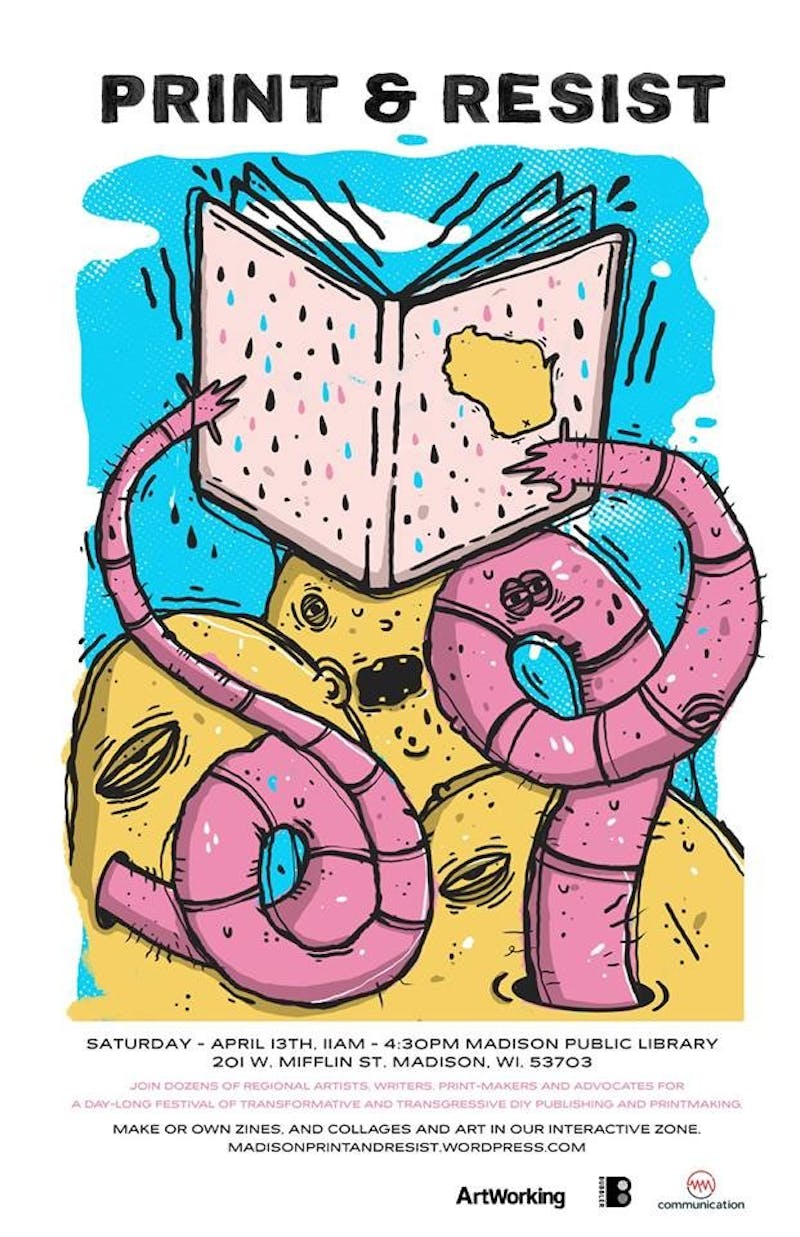
The 2019 Print & Resist Festival was held on Saturday April 13 at Madison Public Library. The day long event attracted over a thousand people.
Image By: Madison Print & Resist Zinefest
The 2019 Print & Resist Festival was held on Saturday April 13 at Madison Public Library. The day long event attracted over a thousand people.
Image By: Madison Print & Resist ZinefestCo-founder Alexandra Lakind named her art series “Terra Incognita” because she wanted something that is both abstract and clear. The phrase means “unknown land” in Latin and connects to the complex histories of colonization and land acquisition that many of the artists in the series are grappling with in their work “that explore the relationships between humans and the world they inhabit.”
Terra Incognita Art Series, mainly supported by UW-Madison Center for the Humanities; The Holtz Center for Science & Technology Studies; and The Center for Culture, History, and Environment, has brought artists and communities together since 2016. On Saturday, Terra Incognita brought their last visiting artist — bookmaker and designer Aaron Walker — from South Carolina to Madison to participate in the annual festival Print & Resist at Madison Public Library.
Print & Resist, a day-long festival of political print media, zines, experimental publications and workshops related to the world of art, do-it-yourself culture and political action, attracted over 1,000 people.
This free festival provided a space for regional artists, writers, print-makers and advocates to present their works to the Madison community. The idea is that artists should be proud to celebrate themselves, make profits and express opinions at an event accessible to everyone, according to Carlee Latimer, Madison Public Library Bubbler Program assistant.
“This is about team efforts. We have our organizers, volunteers, folks at the library, artists, friends and families. Events like this [are] hard to happen without a community,” Latimer said.
The event intended to bring people together through knowledge exchange. Visitors heard stories behind zine-making processes, learned to make buttons and prints as well as engaged in conversations prompted by artists’ transgressive statements.
“Learning can happen casually and informally. You can keep pushing yourself to engage, be open minded and think about things,” Lakind said.
Throughout the years, Terra Incognita has brought artists from various locations in the Americas to Madison, including Monica Haller, Nina Elder, Stella Brown, Alejandro Meitin and Dylan Miner. While the series provides the local community opportunities to learn about diverse subjects with these artists, Terra Incognita also connects artists with campus groups that specialize in similar topics, according to Lakind.
Elder’s work focuses on changing cultures and ecologies. When she visited UW-Madison, programmers introduced her to lake ecologist Stephen Carpenter, Director of the Center for Limnology, who introduced Elder to other like minded academics and the Wisconsin Water Library, where Elder could explore her interests.
“Not only do we have them connect with other artists on campus, but we made sure that they were connecting with other people who are thinking about similar things in totally different ways, and using totally different methods,” Lakind said. “We wanted to make sure their time here was really meaningful.”
Beyond planning artist-led workshops and events for local communities, the program itself takes on multiple projects involving environmental issues. This year Terra Incognita worked on two books: “Becoming Botanicals,” a collection of works on human-plants relationships from more than 50 artists, researchers and poets around the world, and “Water Infrastructures Handbook, 1348-2019,” a book about water infrastructure based on the work of Rob Lundberg, a musician and another Terra Incognita Art Series programmer.
At Saturday’s Print & Resist, Terra Incognita and its visiting artist Aaron Walker introduced “Water Infrastructures Handbook 1348-2019” to the public.
Jennifer Jiang is a contributor for the Daily Cardinal. To read more of her work, click here.